New generative AI software targets dealerships and automakers

![]()
Impel’s new Chat AI tool is in the same technology family as ChatGPT. Impel says its version is customized in a number of ways and is aimed at auto dealers and automaker customers.
June 30, 2023 – Mark Hollmer
Dealership software provider Impel is rolling out a chatbot driven by generative artificial intelligence that’s designed for auto dealers and automakers. The release of its Chat AI automated conversational tool follows the company’s $104 million growth equity financing disclosed in January.
Chat AI is now in beta testing with roughly 50 U.S. dealerships. Plans call for rolling it out more widely and cross-selling to its 5,000-plus dealership and automaker customers in about 60 days, said Impel co-founder and CEO Devin Daly.
“It’s a critical missing piece to e-commerce and auto,” Daly told Automotive News.
Pilot participants include Rohrman Automotive Group in the Midwest. In a statement, Jeremy Nowling, Rohrman Automotive’s sales, digital retailing and implementation director, said the tool has helped improve customer experiences and boosted efficiency in dealership operations.
Chat AI is designed in part to integrate with existing dealership management systems including those from CDK Global Inc., Reynolds and Reynolds, Cox Automotive Inc.’s Dealertrack and Tekion, Daly said. CDK Global confirmed to Automotive News that the tool can be integrated, while Reynolds and Reynolds said Impel’s tool is going through its certification process.
Daly said Chat AI also can be woven directly into dealership websites.
Additionally, Chat AI will be offered with Impel’s AI-driven digital engagement platform, which relies on proprietary shopper behavioral data and generative conversational AI technology to bring more personalized interactions to an auto customer throughout the buying experience. That system has features such as 360-degree video walk-arounds of other vehicles with similar prices and safety features.
The new Impel Chat AI tool is not unlike ChatGPT, a broader and partially open-source conversational chatbot designed by OpenAI and used by multiple industries including parts of the auto industry. CarGurus and Edmunds, for example, introduced ChatGPT plug-ins so car shoppers can ask questions and get access to vehicle reviews and other information. Hireology, a Chicago dealership recruitment technology company, also launched a technology tool designed to bring ChatGPT to automotive retailers’ human resources operations.
Daly acknowledged that both ChatGPT and Chat AI are based on generative AI and allow for more conversational, personal and customized consumer experiences. But Chat AI has added customizations and features that can understand and generate text the way a human would, Impel said.
Chat AI is built, in part, with “domain-specific prompt engineering” based on more than 100 million automotive consumer interactions, according to Impel. Chat AI also has been designed to prevent a ChatGPT glitch in which the tool sometimes makes up something that isn’t true, Impel said.
“Just using GPT off the shelf does not really drive business outcomes for dealers and OEMs,” Daly said.
Impel’s new product launch represents the latest stage of steady progress for the company.
The Syracuse, N.Y., company launched as SpinCar in 2014 and changed its name to Impel last year. It has raised more than $126 million in venture investment to date, including its January raise, a spokesperson said. Impel, a private company, employs 220 people and also has integrations with third-party marketplaces and platforms including Carfax, Cars.com, CarGurus, Edmunds, and others.
Annual revenue is approaching $100 million for 2023, and the company is “highly profitable,” the spokesperson said.
Impel’s jump into generative AI is possible, in part, because of its 2021 acquisition of Pulsar AI, which was focused on the technology. It also acquired CarLabs.ai late last year to help propel a continued expansion into fixed operations.



